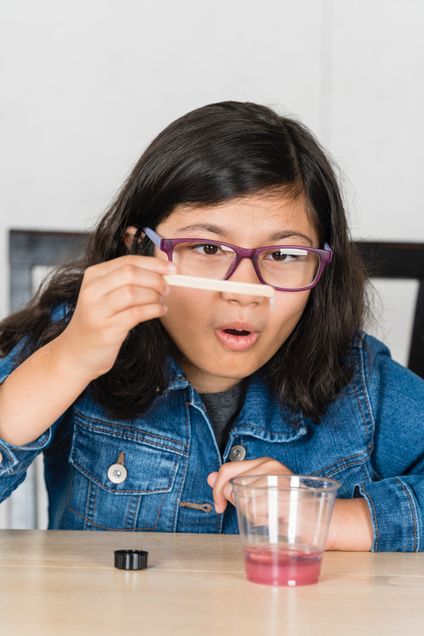Stemming a Grade-School Brain Drain
With nonprofit and book, alumna seeks to hook girls on STEM fields
By Patrick L. Kennedy
The girls raised their hands to ask and answer questions when Sarah Foster (ENG’05) visited her sons’ second- and third-grade classrooms as a volunteer, running engineering activities. Evidently, both boys and girls were curious about science, technology, engineering and math, and they participated equally.
But when her sons reached fourth and fifth grades, Foster noticed an unfortunate trend: The girls were keeping their hands down. As if they’d already concluded they weren’t welcome in STEM discussions. “I was surprised to see that gender gap happening at such a young age.”

That’s when Foster decided to launch STEM Like a Girl, a nonprofit education program with a mission to excite and empower girls with knowledge and confidence in the STEM fields. Recently, she published a book. STEM Like a Girl: Empowering Knowledge and Confidence to Lead, Innovate, and Create is a collection of experiments—culled from Foster’s many workshops—that kids can do with ordinary household goods. “I wanted to create a resource that shows girls you don’t have to be a famous scientist. You can do this.”
As a child, Foster enjoyed and excelled in science and math. In high school, her teachers recognized that aptitude and were encouraging, but only in one or two directions, she recalls. “They said, ‘Why don’t you be either a doctor or a science teacher?’”
So, she enrolled in Bucknell University as a premed major. “It wasn’t until then that a professor said to me, ‘Have you thought about engineering?’ That’s when I got into chemical engineering and really found my interest.”
After doing a summer internship in BU’s Biomedical Engineering Department, Foster realized she wanted to do research. “Really, I’m an engineer by nature,” she says. “I have a very analytical thought process, and I loved the idea of planning out experiments, seeing what worked, what didn’t work and adjusting from there. So, I liked the whole methodology of experimentation.”
That experience led her to enroll in the BME master’s degree program. “I liked that I could be doing projects that were helping people; that had a direct impact on people’s lives,” she says.
At ENG, Foster was inspired by mentors such as Professor Joyce Wong (BME, MSE). “Seeing these strong women in their careers and families was important for me and shaped what I ultimately went on to do.”
After earning her master’s, Foster was hired as an R&D engineer for Genzyme (now Sanofi Genzyme), where she worked on hydrogel technology for implantable devices.
After several years, Foster, her husband and their two young boys moved to Portland, Oregon. That’s where she was volunteering in her sons’ elementary school and discovered the STEM gender gap rearing its head earlier than she’d expected.
She launched STEM Like a Girl in 2017 with a volunteer board drawn from Portland’s female engineer community. The group hosts half-day workshops where girls, along with their parents or other caregivers, take part in hands-on activities, learn about the design process and meet female STEM mentors.
The inclusion of parents in the activities is intended to reach families in which there’s no STEM role model. “We’ve heard from a lot of parents who weren’t trained in a STEM background, so they’re not comfortable with it themselves. This is a chance for them to share in their daughter’s excitement and try things together.”

Examples of experiments in the workshops and in the book include making an air cannon out of a paper cup and a bag; making a fizzy bath bomb with baking soda, citric acid, Epsom salt and corn starch; and making a rocket out of a drinking straw and construction paper.
“One of my favorites is when they get to isolate DNA from a strawberry,” says Foster. “That can be a little messy, but it’s a lot of fun. We take strawberries and mash them up and extract out the chromosomal DNA from the strawberry. You can actually see it separating in the liquid that you use, and you pull out this glob of DNA.”
Foster and her colleagues tie these kitchen experiments to their real-world applications, and they stress that experiments rarely go right the first time.
“STEM teaches us so much about life in general,” says Foster. “We can learn leadership skills, confidence, problem-solving techniques. And it’s important for girls, especially, to build that confidence and see that these are careers you can do. A lot of girls want to go into careers where they can help people—and there are so many opportunities in STEM for that.”
Photo at top: Jenna Perfette Photography
This story originally appeared in the spring 2022 issue of ENGineer, the alumni magazine of the Boston University College of Engineering.